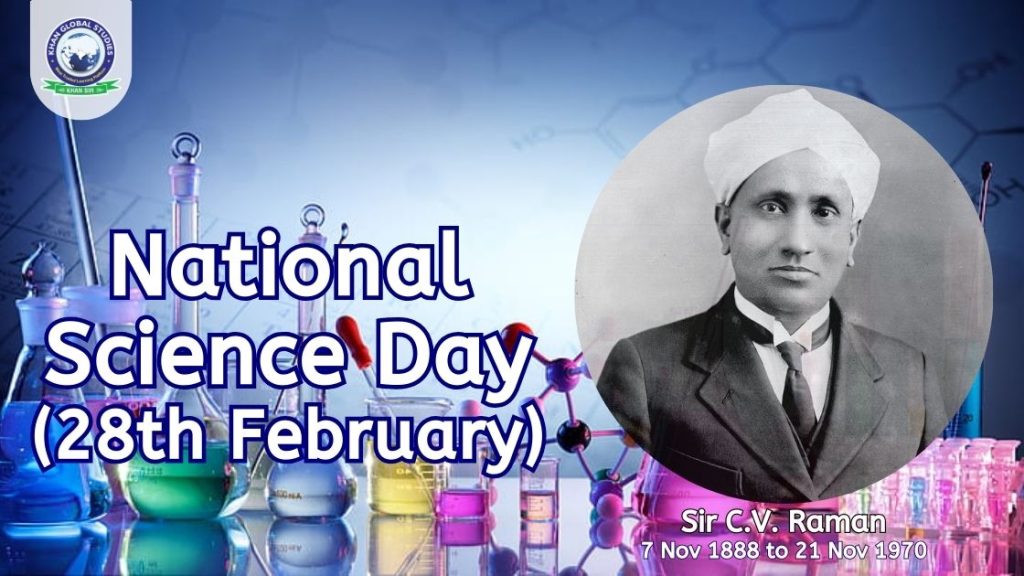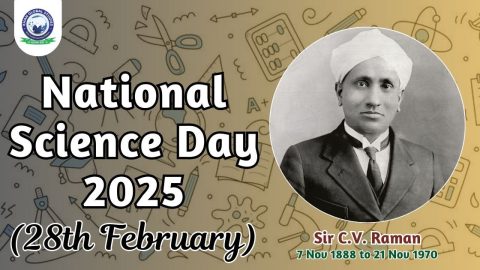National Science Day (28 February) is the day when India celebrates the discovery of the Raman effect along with appreciating the contribution of our scientific community. With the theme of “Indigenous Technology for a Developed India”, the country is all set to celebrate National Science Day 2024 on 28th February 2024. Because India celebrates the achievements of our scientific community on this special day.
About National Science Day
National Science Day is celebrated every year on 28 February in India to commemorate the discovery of the “Raman Effect” by Indian physicist Sir Chandrashekhar Venkata Raman (C.V. Raman). The occasion also serves as a platform to appreciate and increase public awareness about the contribution of our scientific community to the development of our nation.
History of National Science Day (NSD) in India
The history of National Science Day in India starts in the late 1920s. The chronology of its origin and development in India is given below.
1928: Discovery of Raman Effect
- On 28 February 1928, Sir C.V. Indian physicist Raman made a remarkable discovery of the phenomenon of scattering of light in inelastic collisions with molecules of matter.
- This discovery was later named the “Raman effect” after its discovery.
1930: Sir C.V. Raman won the Nobel Prize
- The discovery of the Raman effect revolutionized our understanding of light-matter interactions and had a transformational impact on various branches of science. Understanding its importance, Sir C.V. Raman was awarded the Nobel Prize for Physics in 1930.
- An Indian scientist becoming the first Asian to receive a Nobel Prize in any branch of science was an important milestone for Indian science. Apart from validating India’s scientific potential, it also placed India on the global scientific map.
1986: NCSTC proposal
- In 1986, the National Council for Science and Technology Communication (NCSTC) proposed to the Government of India to designate 28 February, the date of discovery of the Raman Effect, as National Science Day.
- The idea behind the NCSTC proposal was to celebrate the pioneering discovery of the Raman effect as well as encourage scientific thinking and awareness among the Indian population.
- In early 1986, the government accepted the proposal of the NCSTS and formally declared 28 February as the National Science Day, celebrated annually in India.
1987: First National Science Day
The first official celebration of National Science Day in India was organized on 28 February 1987.
Since then, it has become an important event in the academic and scientific communities across India, promoting science and scientific thinking among the general public.
What is the Raman effect?
Briefly, the Raman effect refers to the change in wavelength of light that occurs when a light beam is scattered and deflected by molecules of matter.
When a monochromatic beam of light passes through a dust-free, transparent sample of a substance, its light photons undergo inelastic collisions with the molecules of the substance. These collisions scatter a part of the incident light in directions other than the incident beam. Depending on the energy exchange during the light-molecule interaction, the scattered light consists of one of the following types of light waves:
- Rayleigh Lines: Most light returns unchanged. Thus, a large portion of the scattered light has the same wavelength as the incident light. This is called Rayleigh scattering.
- Stokes Raman lines: A small portion of the scattered light loses energy in the molecules of the substance, and returns with less energy. Thus, its wavelength is greater than the wavelength of the incident light. This is known as Stokes-Raman scattering.
- Anti-Stokes Raman lines: Very rarely, some part of the scattered light receives energy from the interacting molecule, and returns with higher energy. Thus, its wavelength is less than the wavelength of the incident light. This is called anti-Stokes Raman scattering.
Thus, the Stokes Raman lines and anti-Stokes Raman lines vary with the wavelength of the incident light. This phenomenon of change in wavelength of some portion of scattered light is called the Raman effect.
Applications of the Raman Effect
The Raman effect is used in Raman spectroscopy, a method employed to determine and investigate the chemical structure of substances.
The basis of this technique is that the amount and nature of the change in wavelength of the scattered light is unique to each molecule and provides information about its vibrational and rotational energy states. By analyzing this change, scientists can identify the molecule and study its composition, structure, and other properties.
Celebration of National Science Day in India
Here is an overview of some of the common types of events taking place as part of NSD celebrations in India:
- To confer the National Award for Science and Technology Communication in recognition of outstanding efforts in popularizing science among the masses and motivating young minds for scientific activities.
- Radio and television programs aim to promote scientific ideas and thinking.
- Organization of science exhibitions, interactive workshops, lectures etc. by educational institutions.
- Research institutes organize exhibitions of their work showcasing the latest advances and achievements in various scientific fields.
- Non-governmental organizations and community groups also host events, making science accessible to a wider audience.
Objectives of the National Science Day Celebration
Although the day primarily celebrates the historic scientific discovery of an Indian scientist, the celebration of National Science Day revolves around multiple objectives. Some of the major objectives of celebrating National Science Day can be seen as follows:
- To spread the message of the importance of science and its application in daily life.
- To encourage youth to get involved in scientific activities and consider careers in science and technology
- To generate scientific temper among the general public and promote a culture of innovation.
National Science Day 2024 Celebration
Like every year, India is celebrating National Science Day 2024 on February 28, 2024. According to the Department of Science and Technology, this year’s National Science Day celebrations will be based on the theme of “Indigenous Technology for a Developed India”.
Theme of National Science Day 2024
Every year, the Department of Science and Technology declares a theme for the NSD celebrations that highlights an important aspect of India’s scientific endeavour and its social implications. These themes reflect the multifaceted role played by science in addressing contemporary challenges.
The theme of the National Science Day 2024 celebration has been decided as “Indigenous Technology for Developed India”. The diverse importance of this topic can be seen as follows:
- Reflects a strategic focus on fostering public awareness and appreciation for the indigenization of science, technology and innovation
- Appreciates and promotes the achievements of the Indian scientific community in addressing the challenges of the country’s progress through indigenous technologies.
- It marks a new era of opportunity for the public and scientific fraternity, both domestically and internationally, to collaborate and work together to contribute to the well-being of India and humanity as a whole.
- The importance of science in making India self-reliant has been emphasized.
- Affirms the vision of Amrit Kaal – “Developed India@2047”.
Importance of National Science Day Celebration
In a rapidly changing world where scientific and technological advancements are reshaping society, the annual celebration of National Science Day assumes immense importance for several reasons listed below:
- Encourages our Scientists: A national festival to celebrate the discovery of the Raman Effect is tantamount to honouring the entire scientific community of our country. This encourages them to promote their scientific endeavours.
- Promotes Awareness about Science: Outreach programs organized as part of National Science Day celebrations help broaden people’s understanding of various scientific concepts and recent advances.
- Promotes Scientific Temper: Various lectures, debates, quizzes and exhibitions organized on this day educate people about the latest scientific advancements and inculcate scientific temper and rational thinking in them. Thus, it helps in implementing the fundamental duty enshrined in Article 51A of the Indian Constitution.
- Sparks Curiosity in Young Minds: Fun activities like exhibitions, workshops and science fairs introduce children to science in a fun and interactive way, thereby inculcating a passion for it.
- Highlights progress in Indian Science: National Science Day serves as a showcase of the latest achievements and initiatives in various scientific fields across India. It promotes national pride and inspires future generations to pursue scientific careers.
- Encourages International Collaboration: By celebrating science at the national level, India demonstrates its commitment to scientific progress and opens doors for collaboration with international scientific communities.
- Strengthens the Scientific Foundation: By inspiring future generations to contribute to scientific progress and address global challenges through science, it strengthens the scientific foundation of our nation.
More than celebrating the historic scientific discovery of the Raman effect, the significance of the NSD celebration lies in reflecting on India’s ongoing journey to becoming a global scientific superpower. By honouring the past, celebrating the present and envisioning the future, it plays a vital role in shaping India’s scientific progress. It is a day that reaffirms the country’s collective aspiration to discover and innovate for a better tomorrow where science and technology are used to create a more equitable, sustainable and prosperous world for all.
FAQs
Question: What is National Science Day?
Answer: National Science Day is an annual celebration in India, celebrated on 28 February, to commemorate the discovery of the Raman effect by Indian physicist Sir Chandrashekhar Venkata Raman on the same day in 1928.
Question: When is National Science Day celebrated in India?
Answer: In India, National Science Day is celebrated every year on 28 February.
Question: What is the theme of National Science Day 2024?
Answer: The theme of the National Science Day 2024 celebration is “Indigenous Technology for Developed India”. This theme reflects the government’s increasing focus on the indigenization of technologies.
Question: Why do we celebrate National Science Day?
Answer: National Science Day in India Sir C.V. It is celebrated to commemorate the discovery of the Raman Effect. Raman on February 28, 1928. Along with this, the objective of this festival is also to promote scientific thinking among the public.
Question: When was the first National Science Day celebrated?
Answer: The first National Science Day in India was celebrated on 28th February 1987. The Government of India, on the recommendation of the National Council for Science and Technology Communication (NCSTC), designated the day as National Science Day in 1986 to commemorate the anniversary. Sir C.V. Raman effect was discovered by Raman in 1928.




